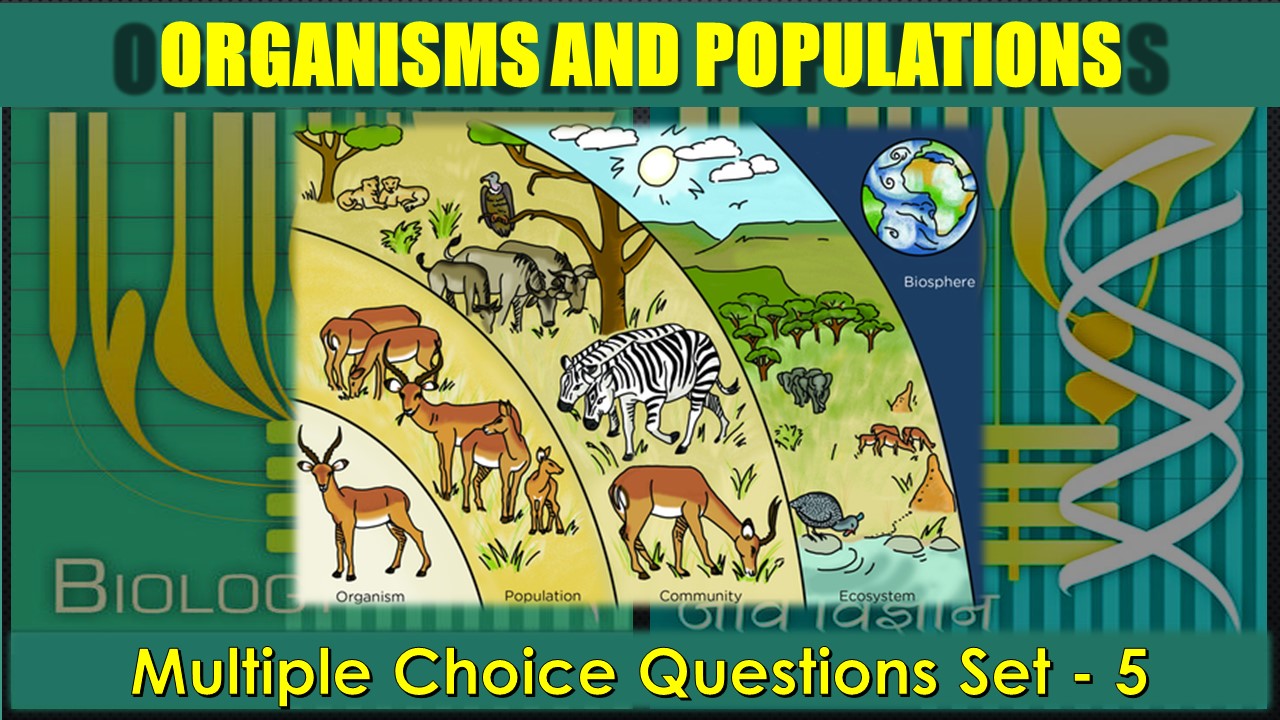CBSE Class 12 Organisms and Populations Multiple Choice Questions with Answers. MCQ Questions Class 12 Organisms and Populations with Answers Is Prepared Based on Latest Exam Pattern. Students can solve NCERT MCQ questions Class 12 Organisms and Populations with Answers to know their preparation level.
Students who are searching for NCERT MCQ Questions Class 12 Organisms and Populations with Answers are compiled here to get good practice on all fundamentals. Know your preparation level on MCQ Questions for Class 12 Organisms and Populations with Answers. You can also verify your answers from the provided MCQ Class 12 Organisms and Populations with Answers. So, ace up your preparation with MCQ of Class 12 Biology Examinations.
MCQ Questions Class 12 Organisms and Populations with Answers - Set - 5
Question 1:
Carnivorous animals lions and leopards, occupy the same niche but lions predate mostly larger animals and leopards take smaller ones. This mechanism of competition is referred to as
(a) character displacement
(b) altruism
(c) resource partitioning
(d) competitive exclusion.
Correct Answer – (C)
Question 2:
Homeostasis is
(a) tendency of biological systems to change with change in environment
(b) tendency of biological systems to resist change
(c) disturbance of self regulatory system and natural controls
(d) biotic materials used in homeopathic medicines
Correct Answer – (B)
Question 3:
Which of the following communities is more vulnerable to invasion by outside animals and plants?
(a) Temperate forests
(b) Oceanic island communities
(c) Mangroves
(d) Tropical evergreen forests
Correct Answer – (D)
Question 4:
In Urn shaped age pyramid of the population the trend of growth is
(a) Rapid
(b) Stable
(c) Declining
(d) Stationary
Correct Answer – (C)
Question 5:
Animals have the innate ability to escape from predation. Examples for the same are given below. Select the incorrect example.
(a) Colour change in Chamaeleon
(b) Enlargement of body size by swallowing air in puffer fish
(c) Poison fangs in snakes
(d) Melanism in moths
Correct Answer – (C)
MCQ Questions Class 12 Organisms and Populations With Answers
Question 6:
A population of 500 that experiences 55 births and 5 deaths during a one-year period. What is the reproductive rate for the population during the one-year period ?
(a) 0.01/year
(b) 0.05/year
(c) 0.1/year
(d) 50/year
Correct Answer – (C)
Question 7:
The sum total of the populations of the same kind of organisms constitute
(a) colony
(b) genus
(c) community
(d) species.
Correct Answer – (D)
Question 8:
Plants such as Prosopis, Acacia and Capparis represent examples of tropical
(a) deciduous forests
(b) evergreen forests
(c) grasslands
(d) thorn forests.
Correct Answer – (D)
Question 9:
In which one of the following habitats does the diurnal temperature of soil surface vary most?
(a) Shrub land
(b) Forest
(c) Desert
(d) Grassland
Correct Answer – (C)
Question 10:
Praying mantis is a good example of
(a) camouflage
(b) mullerian mimicry
(c) warning colouration
(d) social insects.
Correct Answer – (A)
- NCERT Solutions Class 11 Chemistry Chapter 1 : Some Basic Concepts of Chemistry
- NCERT Solutions Class 11 Chemistry Chapter 2 : Structure Of The Atom
- NCERT Solutions Class 11 Chemistry Chapter 3 : Classification of Elements and Periodicity in Properties
- NCERT Solutions Class 11 Chemistry Chapter 4 : Chemical Bonding and Molecular Structure
- NCERT Solutions Class 11 Chemistry Chapter 5 : States of Matter
- NCERT Solutions Class 11 Chemistry Chapter 6 : Thermodynamics
- NCERT Solutions Class 11 Chemistry Chapter 7 : Equilibrium
- NCERT Solutions Class 11 Chemistry Chapter 8 : Redox Reactions
- NCERT Solutions Class 11 Chemistry Chapter 9 : Hydrogen
- NCERT Solutions Class 11 Chemistry Chapter 10 : The s-Block Elements
- NCERT Solutions Class 11 Chemistry Chapter 11 : The p-Block Elements
- NCERT Solutions Class 11 Chemistry Chapter 12 : Organic Chemistry: Some Basic Principles and Techniques
- NCERT Solutions Class 11 Chemistry Chapter 13 : Hydrocarbons
- NCERT Solutions Class 11 Chemistry Chapter 14 : Environmental Chemistry




